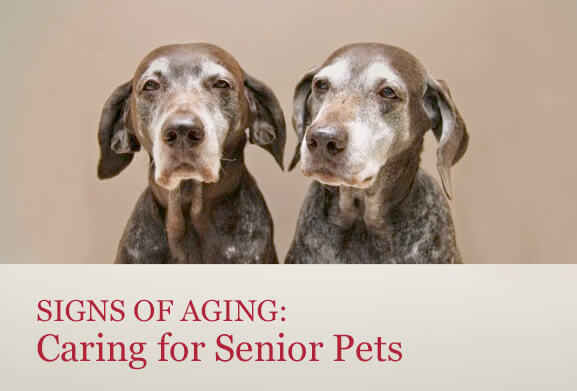As animals age, their needs change. While each species and even each breed of a particular species has its own unique signs and symptoms of aging, as well as unique care needs through the aging process, some signs are universal. At Centre Street Animal Hospital, we often see pets come to our clinic with health problems that are actually signs of the aging process. By becoming aware of the changes to watch for as your pet ages, you can be better prepared for caring for senior pets.
Changes in Metabolism
Just like people, most animals experience a metabolism change in their senior years. Most pets will see their need for calories drop by around 20 percent. This drop is understandable when you consider what your pet is now doing. Instead of running and playing as a youthful animal did, chances are your pet is spending more time cuddling and resting. Less activity means less need for calories.
Consider dogs, as an example. Obesity is one of the main signs of aging in dogs, as the risk for obesity increases with age. Loving owners who continue to feed their older dogs the same food they enjoyed as young adult dogs, without accounting for activity level drops as dogs age, contribute to this problem.
The key to controlling obesity is controlling caloric intake. Older dogs often need a new type of food and sometimes benefit from smaller portions. We can help you determine what food your pet needs and how much he needs. Also, increasing your pet’s activity levels can help.
Graying of the Coat
Pets with a coat of fur will often gray as they age. A little silver around the muzzle is one of the common signs of aging in dogs and cats. This is not a problem that needs to be treated. It’s simply a part of what happens when an animal gets older.
However, pets may also start losing some of their hair. This can be signs of a nutritional deficiency that should be treated. If your pet’s coat is turning dull or is thinning, we can help you choose appropriate supplements to add to his diet to improve his nutritional intake.
Skin Tumors
If you are petting your older dog or cat and feel an unexpected lump in the skin, don’t panic. While tumors should always be inspected by a veterinarian to ensure that they are not cancerous, benign tumors of the skin are common in older animals, especially dogs. These hard lumps rarely cause discomfort and rarely need treatment. However, if the animal is digging at a tumor or it appears to cause discomfort, we can surgically remove it.
If you notice tumors, bring your pet to the veterinarian for a thorough checkup to rule out cancer. Then, monitor the tumors to ensure that they are not impacting your pet’s quality of life. As long as there are not problems, an approach of watchfully waiting and monitoring the tumors is often sufficient.
Painful Joints
Is your pet sleeping more than normal? Older pets have less energy and therefore will often sleep more than younger pets, but this can be a sign of arthritis. Determining if a pet is in pain or is simply being lazy can be hard for many owners, especially when animals are experts at hiding signs of pain. Signs of arthritis may include:
- Stiffness
- Difficulty standing when laying down
- Inability or refusal to climb stairs
- Inability or refusal to jump onto the bed, into the car or onto the couch
If you suspect that your pet may be dealing with arthritis, medications can help. Never try to medicate a pet on your own. Some medications intended for humans can be fatal for pets. Instead, talk to your vet about potential treatment choices. Modifications around the home, such as ramps or stairs to limit jumping and steep climbs, can also help reduce problems caused by arthritis when you are caring for senior pets.
Keeping Aging Pets Comfortable
Caring for senior pets calls for a new focus on health and wellness. They require a new type of care and may even require lifestyle modifications to make their senior years comfortable and rewarding. If you start noticing some of these common signs of aging, the staff at Centre Street Animal Hospital is ready to help. Contact us with your questions, and let us help you ensure that your senior pet enjoys a full, healthy life.

